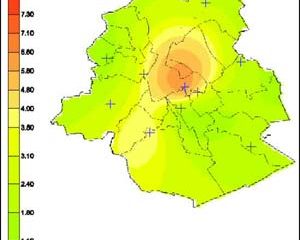Ecology, The Environment and Conservation
This complex theme deals primarily with interactions between organisms and the environmental factors that impact them, but to a greater extent between individual inanimate environmental factors.
innovations-report offers informative reports and articles on topics such as climate protection, landscape conservation, ecological systems, wildlife and nature parks and ecosystem efficiency and balance.

Leaf fall in ancient polar forests still a mystery
Explorers in the 1800s discovered through fossils that deciduous forests once covered the poles, but researchers still do not know why leaf-dropping trees were preferred over evergreens.
“The dominant idea since the 1940s was that because of the polar light regime of continuous darkness and warmth, leafless branches had an advantage over evergreen canopies in the polar forests,” says Dana Royer, research associate in geosciences, Penn State.
This carbon loss hypothesis states that

Scientists build a virtual laboratory for modelling biodiversity patterns
Scientists at the University of Reading are leading a consortium (universities of Reading, Cardiff and Southampton, and the Natural History Museum) that is developing a “virtual laboratory” to help researchers around the world make sense of the mass of diverse, incomplete and often incompatible databases available on different species, according to an article published in the July edition of BBSRC business.
One species covered by the scientists is the yellow-flowered Spanish Broom which is

Burning forests speedily space-mapped for fire fighters
Maps of burning Spanish forests taken from space have been relayed to local fire fighters in near real-time. A successful demonstration campaign using Earth Observation data has taken place in Galicia – delivery time from raw orbital data to final value-added product in the hands of the user came to 92 minutes.
Around 45 000 forest fires start across Europe every year, with half a million hectares of woodland lost in the Mediterranean region alone. The European Commission estimates the cost

Making sense of bacterial biodiversity
What determines the number of species in a given area? The amount of energy available to organisms (an area’s primary productivity) has been shown to be a key determinant of plant and animal biodiversity. However, it is not known if primary productivity can affect bacterial biodiversity. In an article to appear in the July 2003 issue of Ecology Letters, researchers led by a team at Stanford University report for the first time that primary productivity can, in fact, influence the diversity of ba

EU research project proves that personal choice can dramatically improve urban air quality
Stop smoking and leave your car at home. Encouraging people in cities to make simple lifestyle changes, such as using alternative forms of transport to the car, can significantly reduce their exposure to harmful air pollutants. The findings of the first in a series of Europe-wide air quality studies was announced today in Brussels by European Research Commissioner Philippe Busquin and Didier Gosuin, Environment Minister of the Brussels-Capital Region. The first phase of the “Population Exposure to Ai

The flight of ICAROS
EU satellite research project tackles urban air quality from space
A three-year project led by the Commission with ten partners from Greece, Germany, Hungary and Italy has developed an innovative system for monitoring and managing urban air quality and the related health risks. Results of the “ICAROS NET” technique were presented today in Budapest. ICAROS uses satellite-borne sensors to monitor the concentration of harmful particles in the air, caused by heavy industry, traffic and ho